Windshield Replacement Short
Removal Procedure
Caution: When replacing stationary windows, use Urethane Adhesive Kit GM P/N 12346392
(Canadian P/N 10952983), or a urethane adhesive system meeting GM Specification
GM3651G, to maintain original installation integrity. Failure to use the urethane
adhesive kit will result in poor retention of the window which may allow unrestrained
occupants to be ejected from the vehicle resulting in personal injury.
Caution: When working with any type of glass or sheet metal with exposed or rough
edges, wear approved safety glasses and gloves in order to reduce
the chance of personal injury.
Tools Required
| • | Adhesive Kit GM P/N 12346284 or equivalent |
| • | J 24402-A J 24402-A
Glass Sealant Remover (Cold Knife), or equivalent |
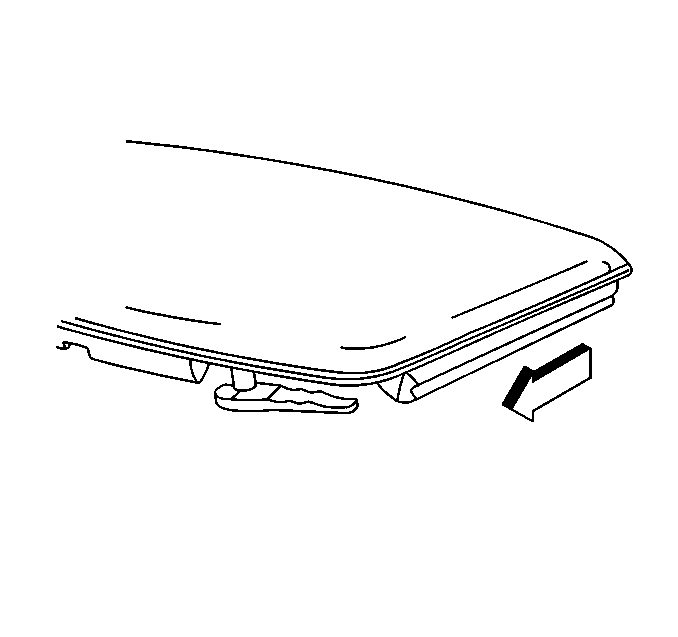
- Remove the roof lift off
panel (coupe) or lower the folding top (convertible).
- Lower the door windows.
- Open the hood.
- Remove the windshield wiper arms and washer hoses. Refer to
Windshield Wiper Arm Replacement
in Washers and wipers.
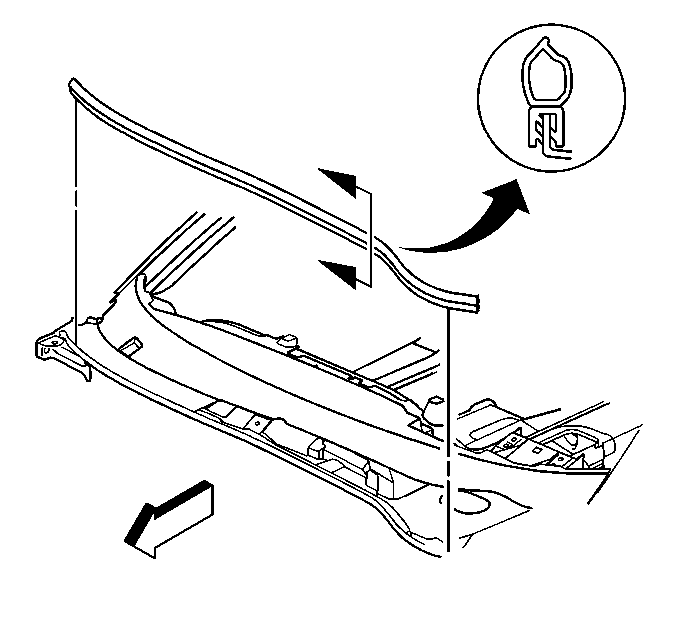
- Remove the plenum to hood seal. Refer to
Hood Rear Seal Replacement
in Body Front End.
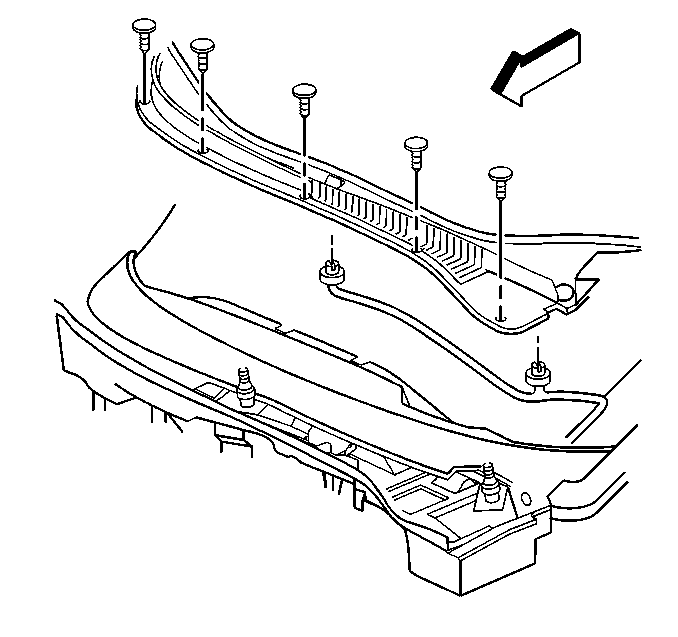
- Carefully remove the air
inlet plenum screen panel. Refer to
Air Inlet Screen Replacement
in Washers and Wipers.
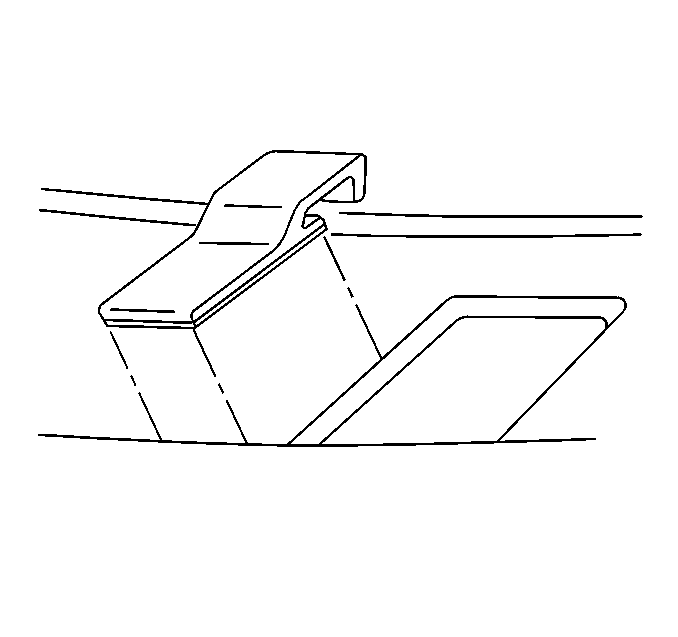
- Mark the location of the
lower windshield supports with a grease pencil or tape.
- Remove the lower windshield supports.
Pry the support
from the lower edge to separate the two sided tape.
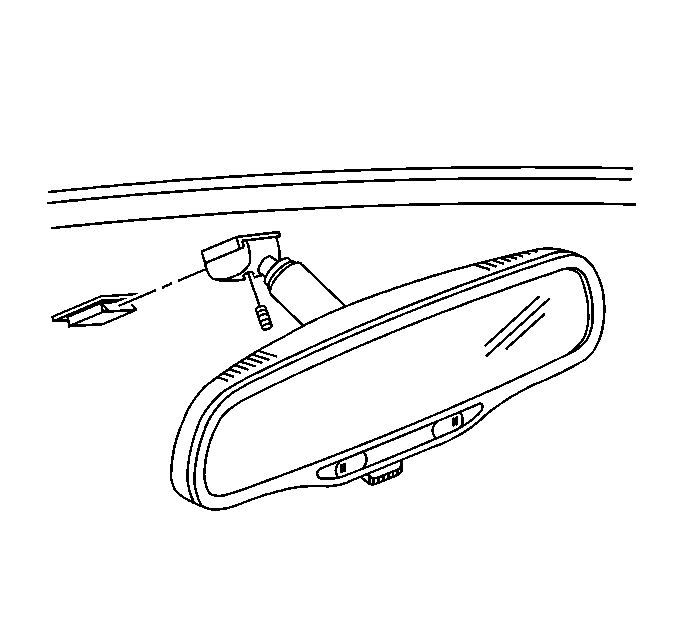
- Cover the vehicle interior
in order to protect the interior from broken glass.
- Tape over the defogger vent.
- Disconnect the inside rearview mirror electrical connector.
- Loosen the mirror attaching screw.
- Remove the inside rearview mirror.
- Disconnect the windshield antenna lead connection (if equipped).
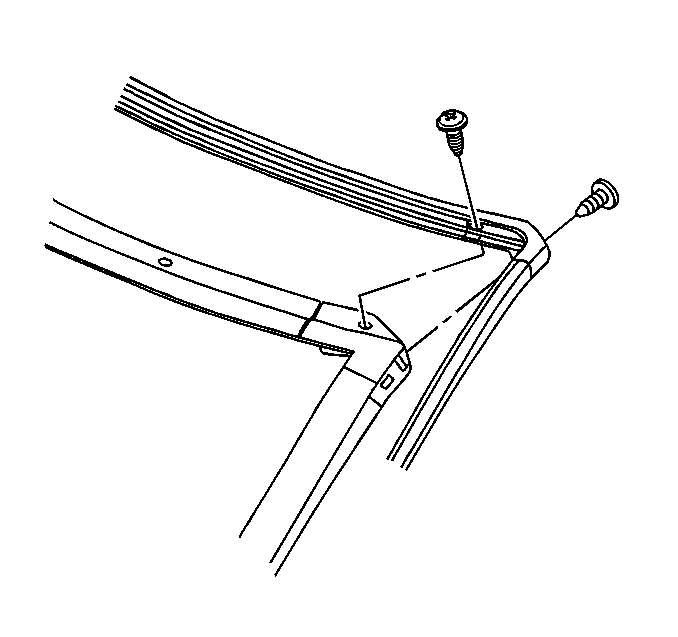
- Remove the windshield
weatherstrip. Refer to
Weatherstrip Replacement
.
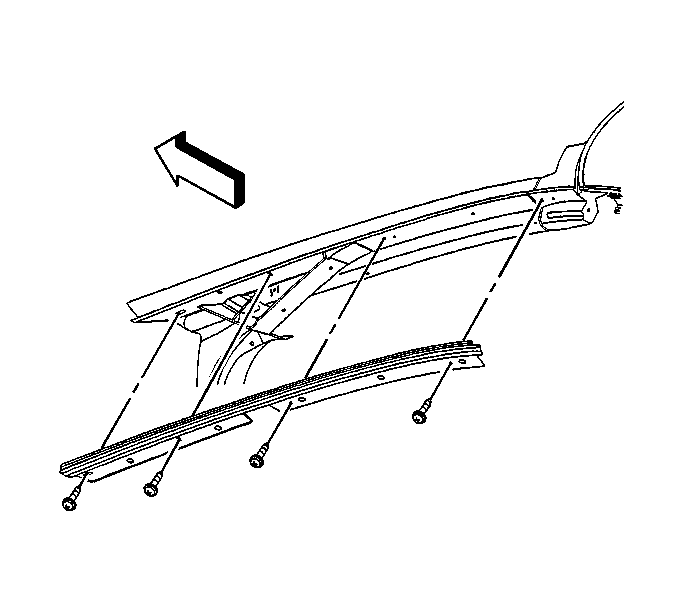
- Remove the windshield
side reveal moldings. Refer to
Windshield Side Reveal Molding Replacement
.
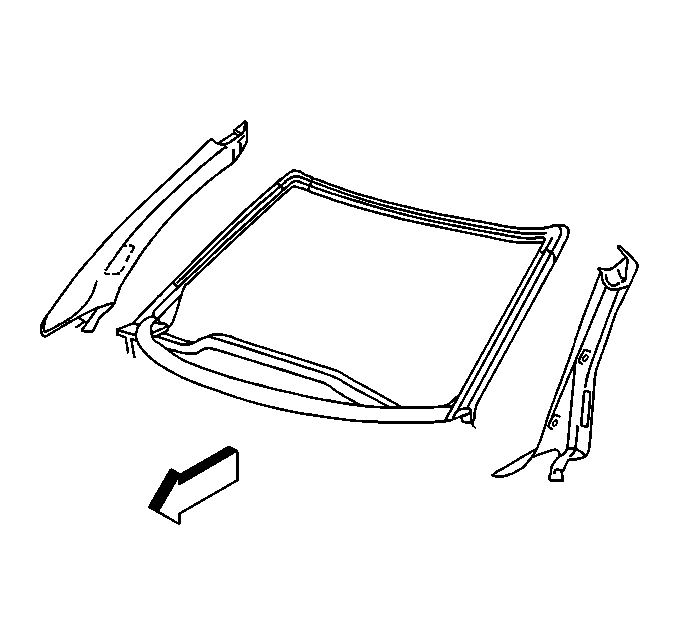
- Remove the windshield
side garnish moldings.
Pull the molding with its retainers from
the windshield frame.
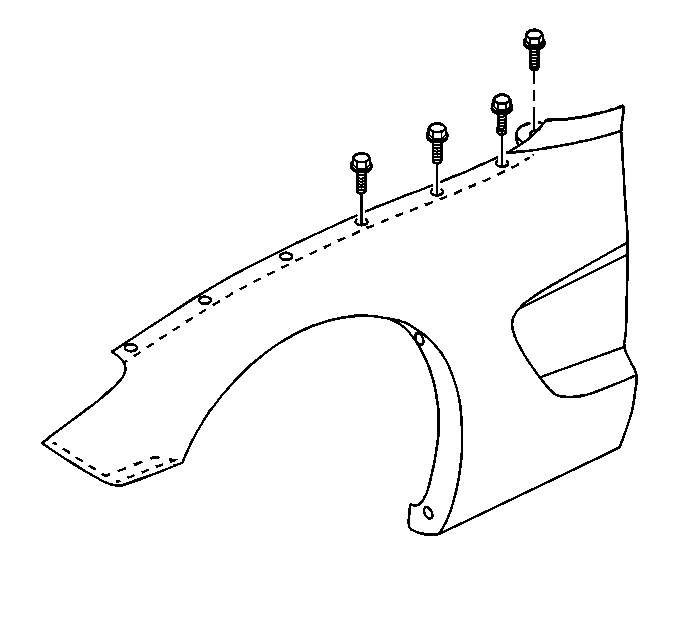
- Remove the 4 rearmost
screws attaching the top of the fender to the wheelhouse.
- Reposition the fender for tool access.
- Tape or otherwise protect the fender from the cutting tool.
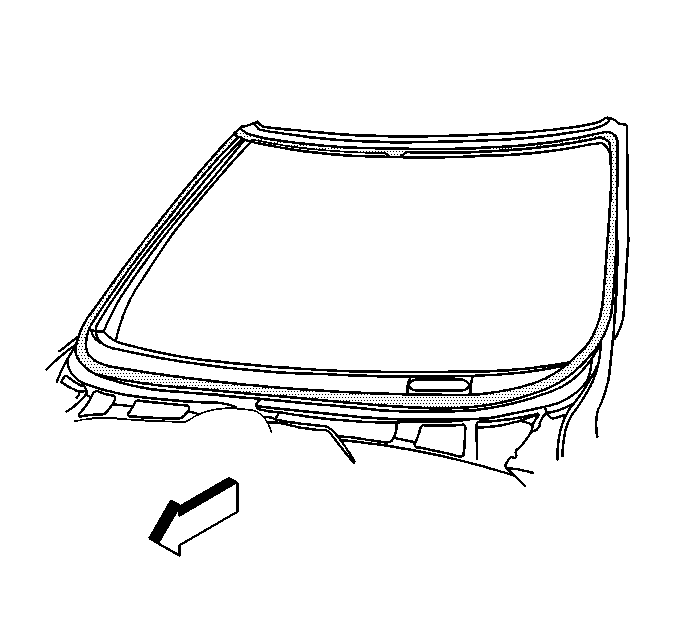
Important: Do not damage the VIN plate when cutting through the urethane.
- Cut around the perimeter of the windshield.
| • | Cut as close to the inside of the windshield as possible. |
| • | Use a cold knife, a pneumatic knife, or a steel music wire with
wooden handles. |
| • | Leave 6.0 mm (0.25 in) of adhesive on the pinch-weld. |
- Remove the windshield from the body opening.
- Vacuum the inside and outside of the vehicle including the vents
to remove all traces of shattered glass.
- Remove old adhesive from a reusable windshield.
Installation Procedure
Caution: When replacing stationary windows, use Urethane Adhesive Kit GM P/N 12346392
(Canadian P/N 10952983), or a urethane adhesive system meeting GM Specification
GM3651G, to maintain original installation integrity. Failure to use the urethane
adhesive kit will result in poor retention of the window which may allow unrestrained
occupants to be ejected from the vehicle resulting in personal injury.
Caution: When working with any type of glass or sheet metal with exposed or rough
edges, wear approved safety glasses and gloves in order to reduce
the chance of personal injury.
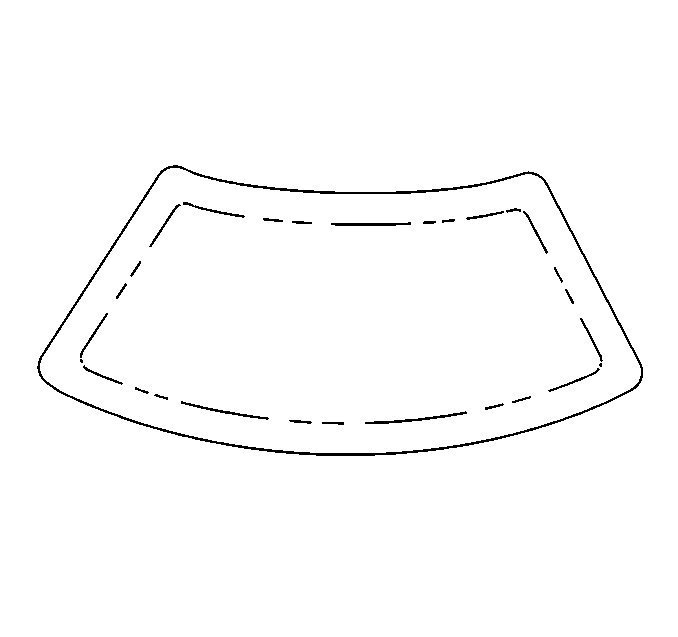
- Inspect the acoustic strip
on the dash panel and replace if necessary.
- Using suction cup holders, position the replacement windshield
in the body opening.
- Carefully inspect the windshield overlap at the body pinch-weld
and the retaining flanges all the way around the body opening.
Specifications
Minimum overlap is 5.0 mm (0.19 in).
- Mark the windshield position at the following locations using
tape:

- Cut the tape used to mark
the location of the windshield to the opening.
- Remove the windshield from the body opening.
- Place the windshield on a protected surface.
- Thoroughly clean the replacement windshield surface to which urethane
is to be applied with GM Window Cleaner P/N 1050427, or equivalent, or an
isopropyl alcohol dampened cloth. Allow the alcohol cleaned surface to
air dry.
- Apply Clear Glass Prep #1 with a dauber to the edge and inner
100 mm (2 in) of the perimeter of the windshield surface and
wipe the surface dry with a clean cloth.
Important:
| • | Urethane will not bond to the windshield unless Black Primer #2 has
been applied to the windshield. |
| • | DO NOT apply Black Primer #2 to existing urethane. |
- Apply Black Glass Primer #2 with a dauber to the edge and inner 100 mm
(2 in) of the windshield surface and allow the surface to dry for
approximately 6 to 10 minutes.
- Cut a notch in the side of the caulking tip 4 mm (3/16 in)
high and wide.
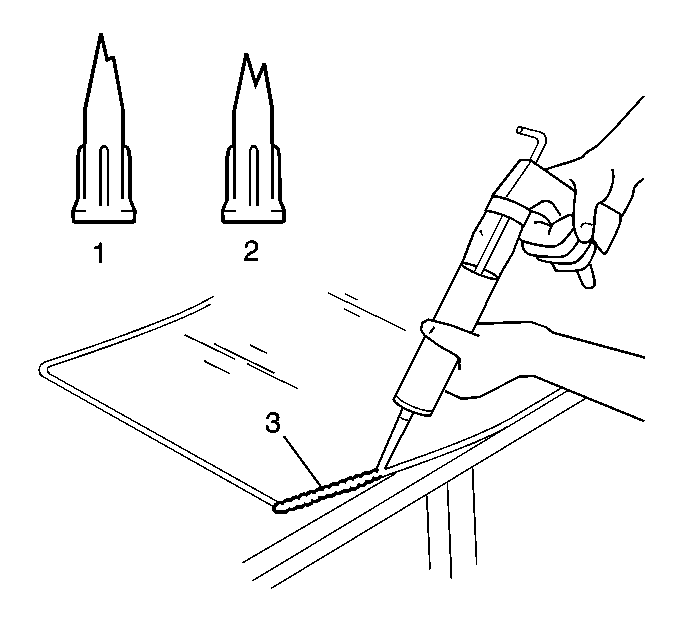
- Apply the windshield adhesive
(3) using a caulking gun:
Hold the gun perpendicular to the surface.

- Apply a smooth continuous
10.0 mm (0.39 in) bead of adhesive directly to the old adhesive
in the body opening.

- Install the windshield:
| 14.1. | Position the windshield in the body opening. |
| 14.2. | Hand press around the windshield perimeter. Paddle the urethane
as needed. |
| 14.3. | Tape the windshield into place. |

- Install the windshield
stops.
Apply two sided tape to the stops.
Align the
stops to the marks on the plenum.
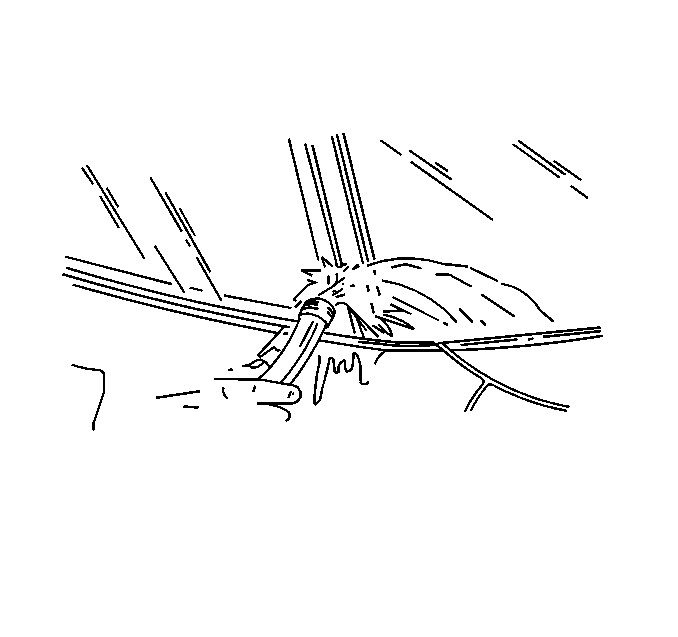
- Water test the windshield
immediately.
| • | Use warm water to accelerate the cure of the urethane adhesive. |
| • | DO NOT direct a hard stream of high pressure water at the fresh
urethane adhesive. |
| • | If leaks are found, apply extra urethane at the leak points using
a plastic paddle and then retest. |

- Install the windshield
side reveal moldings. Refer to
Windshield Side Reveal Molding Replacement
.

- Install the windshield
weatherstrip. Refer to
Weatherstrip Replacement
.

- Install the fender attaching
screws.
Tighten
Tighten the fender upper flange screws to 1.9 N·m (17 lb in).

- Install the air intake
plenum screen. Refer to
Air Inlet Screen Replacement
in Washers and Wipers.

- Install the plenum to hood seal.
- Install the windshield wiper arms and washer hoses. Refer to
Windshield Wiper Arm Replacement
in Washers and Wipers.

- Install the windshield
side garnish moldings.

Notice: Use the correct fastener in the correct location. Replacement fasteners
must be the correct part number for that application. Fasteners requiring
replacement or fasteners requiring the use of thread locking compound or sealant
are identified in the service procedure. Do not use paints, lubricants, or
corrosion inhibitors on fasteners or fastener joint surfaces unless specified.
These coatings affect fastener torque and joint clamping force and may damage
the fastener. Use the correct tightening sequence and specifications when
installing fasteners in order to avoid damage to parts and systems.
- Install the inside rearview mirror.
Tighten
Tighten the rear view mirror mount tension screw to 1.5 N·m
(13 lb in).
- Connect the mirror electrical connector.
- Connect the windshield antenna lead (if equipped).
- Leave the door windows open.
- Close the hood.
- Install the roof panel (coupe) or raise and close the folding
top (convertible).
- Allow the windshield adhesive to cure. Follow the adhesive manufactures
recommendation.
Specifications
| • | The minimum curing time of the moisture cure urethane in GM P/N
12346284 kit is 6 hours. |
| • | The optimum curing temperature is 22°C (72°F) for GM P/N 12346284
kit adhesive. |
| • | DO NOT use compressed air to cure (dry) the urethane adhesive. |
| • | DO NOT drive the vehicle until the urethane is cured. |
Windshield Replacement Long
Removal Procedure
Caution: When replacing stationary windows, use Urethane Adhesive Kit GM P/N 12346392
(Canadian P/N 10952983), or a urethane adhesive system meeting GM Specification
GM3651G, to maintain original installation integrity. Failure to use the urethane
adhesive kit will result in poor retention of the window which may allow unrestrained
occupants to be ejected from the vehicle resulting in personal injury.
Caution: When working with any type of glass or sheet metal with exposed or rough
edges, wear approved safety glasses and gloves in order to reduce
the chance of personal injury.
Tools Required
| • | Adhesive Kit GM P/N 12346284, or equivalent |
| • | J 24402-A J 24402-A
Glass Sealant Remover (Cold Knife with Teflon blade), or equivalent |

- Remove the roof lift off
panel (coupe) or lower the folding top (convertible).
- Lower the door windows.
- Open the hood.
- Remove the windshield wiper arms and washer hoses. Refer to
Windshield Wiper Arm Replacement
in Washers and Wipers.

- Remove the plenum to hood seal. Refer to
Hood Rear Seal Replacement
in Body Front End.

- Carefully remove the air
inlet plenum screen panel. Refer to
Air Inlet Screen Replacement
in Washers and Wipers.

- Mark the location of the
lower windshield supports with a grease pencil or tape.
- Remove the lower windshield supports.
Pry the support
from the lower edge to separate the two sided tape.
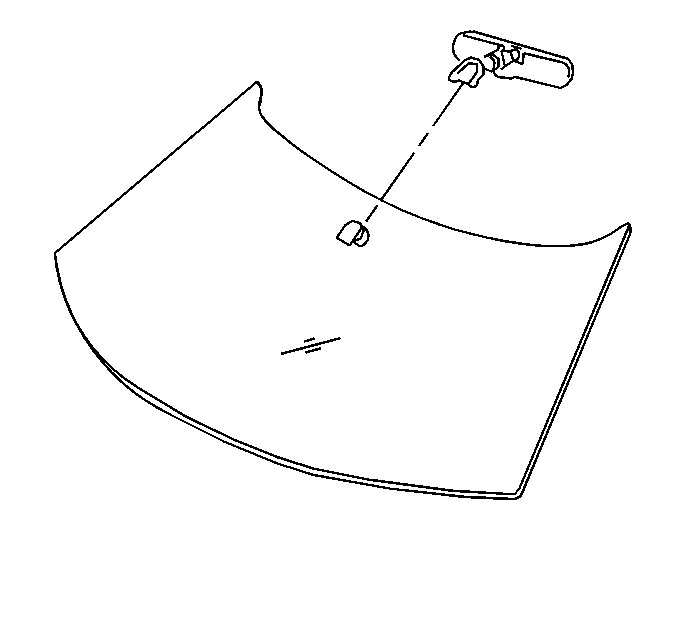
- Disconnect the inside
rearview mirror electrical connector.
- Loosen the mirror attaching screw.
- Remove the inside rearview mirror.
- Disconnect the windshield antenna lead connection (if equipped).
- Tape over the defogger vent.
- Cover the vehicle interior to protect the interior from broken
glass.

- Remove the windshield
weatherstrip. Refer to
Weatherstrip Replacement
.

- Remove the windshield
side reveal moldings. Refer to
Windshield Side Reveal Molding Replacement
.

- Remove the windshield
side garnish moldings.
Pull the molding with its retainers from
the windshield frame.

- Remove the 4 rearmost
screws attaching the top of the fender to the wheelhouse.
- Reposition the fender for tool access.
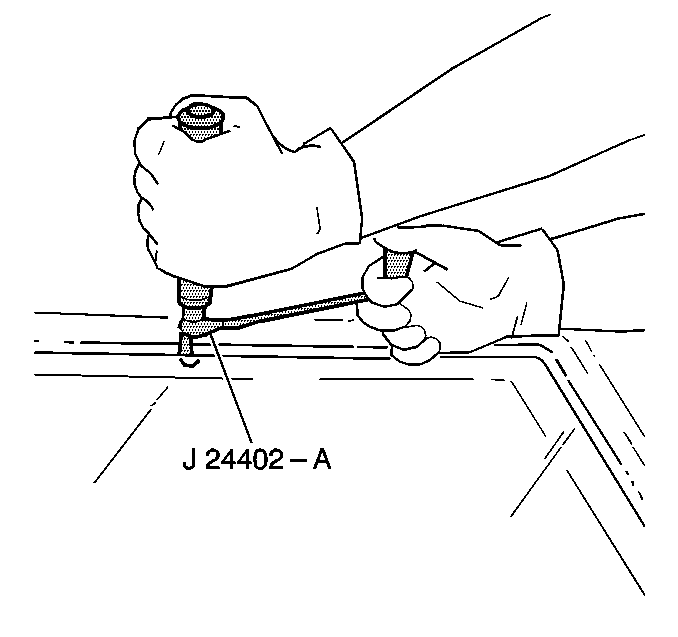
- Tape or otherwise protect
the fender from the cutting tool.
Important: Do not damage the VIN plate when cutting through the urethane.
- Cut out the windshield.
| • | Cut around the perimeter of the windshield. |
| • | Cut next to the windshield. |
| • | use a J 24402-A
J 24402-A cold knife, or equivalent, or a pneumatic knife. |

- Remove the windshield
from the body opening.
- Remove the old urethane from the windshield opening leaving a
thin film 1-2 mm (1/16 in) of adhesive on the pinch-weld.
- Vacuum the inside and outside of the vehicle including the vents
to remove all traces of shattered glass.
- Remove any old adhesive from a reusable windshield.
Installation Procedure
Caution: When replacing stationary windows, use Urethane Adhesive Kit GM P/N 12346392
(Canadian P/N 10952983), or a urethane adhesive system meeting GM Specification
GM3651G, to maintain original installation integrity. Failure to use the urethane
adhesive kit will result in poor retention of the window which may allow unrestrained
occupants to be ejected from the vehicle resulting in personal injury.
Caution: When working with any type of glass or sheet metal with exposed or rough
edges, wear approved safety glasses and gloves in order to reduce
the chance of personal injury.
Notice: Until the new urethane has cured, air pressure from a closing door may
cause the stationary window to move causing a leak. To prevent this, lower
a window before closing the door.

- Inspect the acoustic
strip on the dash panel and replace if necessary.
- Using suction cup holders or with the aid of a helper dry fit
the window by position the replacement windshield in the body opening.
- Carefully inspect the windshield overlap at the body pinch-weld
and the retaining flanges all the way around the body opening.
Specifications
The minimum overlap should be 5.0 mm (0.19 in).
- Mark the windshield position at the following locations using
masking tape:

- Install the windshield
stops.
Apply two sided tape to the stops.
Align the
stops to the marks.

- Cut the tape used to mark
the location of the windshield.
- Remove the windshield from the body opening.
- Place the windshield inside up on a clean protected surface.
- Clean the replacement windshield surface to which urethane adhesive
is to be applied with GM Window Cleaner P/N GM 1050427, or equivalent,
or an isopropyl alcohol dampened cloth. Allow the alcohol cleaned surface
to air dry.
Important: Care should be taken to prevent window prep #1 (clear) from running
into the vision area of the windshield. This primer dries almost instantly,
but may stain the viewing area of the window if not applied
evenly.
- Apply Clear Glass Prep #1 with a new dauber to the edge and inner 50 mm
(2 in) of the perimeter of the windshield surface and wipe the surface
dry with a clean cloth.
Important: Urethane will not bond to the windshield unless Black Primer #2 is applied
to the windshield.
- Shake Black Glass Primer #2 well and apply with a new dauber to the
edge and inner 50 mm (2 in) of the windshield surface and allow
the surface to dry for approximately 6 to 10 minutes.

Important:
| • | Urethane will not bond to the pinchweld unless Black Primer #3 is applied
to the pinchweld. |
| • | Do Not apply the primer to existing urethane adhesive. |
| • | The pinchweld should be an original paint or primed surface not an
after-market finished painted surface. |
- Shake the Black Pinchweld Primer #3 well and apply with a new dauber
to all scratches and bare primer paint on the pinchweld and allow the surface
to dry for approximately 10 minutes.

- Cut a notch in the side
of the caulking tip 10 mm (0.39 in) high and 4.5 mm
(0.18 in) wide.
- Apply the windshield urethane adhesive (3) using a caulking gun.
Hold the gun perpendicular to the surface.

- Apply a smooth continuous
10 mm (0.39 in) wide and 16 mm (0.62 in) high
bead of urethane adhesive directly to the windshield opening.

- Install the windshield
in the opening and align to the previously installed tape.
| • | Hand press the windshield firmly in place. |
| • | Tape the windshield to the body to minimize movement. |
| • | Paddle the urethane adhesive as needed. |
| • | Clean up any urethane adhesive squeezed out from under the window. |

- Watertest the windshield
immediately.
| • | Use warm water if available. |
| • | DO NOT direct a hard stream of high pressure water at the fresh
urethane adhesive. |
| • | Water will accelerate the cure of the urethane adhesive. |
- If leaks are found, apply extra urethane adhesive at the leak
points using a plastic paddle and then retest with water.

- Install the windshield
side reveal moldings. Refer to
Windshield Side Reveal Molding Replacement
.

- Install the windshield
weatherstrip. Refer to
Weatherstrip Replacement
.

- Install the fender mounting
screws.
Tighten
Tighten the fender upper flange screws to 1.9 N·m (17 lb in).

- Install the air intake
plenum screen. Refer to
Air Inlet Screen Replacement
in Washers and Wipers.

- Install the plenum to hood seal. Refer to
Hood Rear Seal Replacement
in Body Front End.
- Install the windshield wiper arms and washer hoses. Refer to
Windshield Wiper Arm Replacement
in Washers and Wipers.

- Install the windshield
side garnish moldings.

Notice: Use the correct fastener in the correct location. Replacement fasteners
must be the correct part number for that application. Fasteners requiring
replacement or fasteners requiring the use of thread locking compound or sealant
are identified in the service procedure. Do not use paints, lubricants, or
corrosion inhibitors on fasteners or fastener joint surfaces unless specified.
These coatings affect fastener torque and joint clamping force and may damage
the fastener. Use the correct tightening sequence and specifications when
installing fasteners in order to avoid damage to parts and systems.
- Install the inside rearview mirror.
Tighten
Tighten the rearview mirror mount tension screw to 1.5 N·m
(13 lb in).
- Connect the mirror electrical connector.
- Connect the windshield antenna lead connection (if equipped).
- Leave the windows open to avoid causing pressure when closing
the doors which could cause a leak in the urethane adhesive.
- Close the hood.

- Install the roof lift
off panel (coupe) or raise and close the folding top (convertible).
- Allow the windshield urethane adhesive to cure.
Specifications
| • | Minimum curing time of the moisture cure urethane in GM P/N 123456284
kit is 6 hours. |
| • | Optimum curing temperature is 22°C (72°F). |
| • | DO NOT use compressed air to dry (cure) urethane adhesive. |
| • | DO NOT drive the vehicle until the urethane adhesive is cured. |



















































